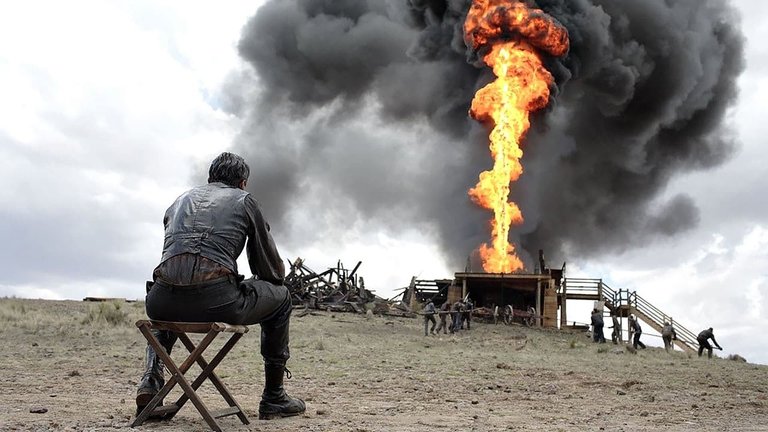Film Review: There Will Be Blood (2007)

There Will Be Blood, the 2007 period drama written and directed by Paul Thomas Anderson, has been lauded as a masterpiece by many, yet upon closer inspection, it seems to be more of an Oscar-bait film than a true classic. This is not to say that Anderson's work lacks talent, but rather that his reputation has clouded the judgment of critics, leading to the film's undeserved acclaim.
There Will Be Blood is very loosely based on Upton Sinclair's 1927 novel Oil!, a work of an author known for its incisive critique of American society and its socialist leanings. The film introduces us to Daniel Plainview, portrayed by Daniel Day-Lewis, an aspiring oil tycoon whose relentless pursuit of wealth drives him to extremes. Plainview is depicted as a figure willing to sacrifice not only his well-being but also the welfare of those around him in his quest for riches. We first encounter him in 1898 as he prospect for silver in New Mexico; after achieving modest success, he turns his attention to the burgeoning oil drilling industry. By 1902, following a tragic accident that claims one of his workers' lives, he adopts the man's orphaned son, H.W., played by Dillon Freasier. This act serves as a strategic move to bolster his image as a family man while negotiating land leases for oil exploration in Little Boston, a small impoverished Californian community. As the story unfolds, we witness Plainview's initial success give way to conflict, particularly with Eli Sunday (played by Paul Dano), an evangelical preacher seeking financial support for his church.
Like many Oscar-bait films, There Will Be Blood is built upon a foundation of strong acting performances. In this case, Daniel Day-Lewis delivers a formidable portrayal of Plainview—a charismatic yet fearsome entrepreneur whose obsession with material wealth is matched only by his moral depravity. Day-Lewis's performance earned him his second Academy Award for Best Actor, a recognition that many critics argue is well-deserved. However, this intensity ultimately overshadows other elements within Anderson's film, leading to an experience that feels unbalanced.
To Anderson's credit, he directs with his characteristic skill, effectively utilising Texan locations to represent California. The film’s cinematography by Robert Elswit, which won an Academy Award, employs long tracking shots that contribute to an epic feel despite the absence of large-scale action or spectacle—save for a notable oil blowout disaster scene. The visual storytelling is compelling; however, it raises questions about whether style compensates for narrative depth.
Despite Day-Lewis's compelling performance, There Will Be Blood suffers from a notable deficiency in memorable supporting characters. Aside from Plainview, there are few individuals with whom audiences can empathise or root for throughout the film. Eli Sunday emerges as a particularly unappealing character—a blend of religious fanaticism and cowardice that fails to resonate positively with viewers. Even H.W., initially portrayed as innocent and vulnerable, reveals darker tendencies in a single instance of attempted murder. The only character who elicits some sympathy is Henry (played by Kevin J. O’Connor), who claims to be Plainview’s brother and exhibits moments of humanity amidst the pervasive greed surrounding him. However, this fleeting connection does little to alleviate the overall sense of isolation that permeates the film.
Another significant flaw lies in Jonny Greenwood's musical score, which often veers into unpleasant territory. Rather than enhancing the film’s emotional landscape, the score tends to feel pretentious and overly "artsy," detracting from rather than contributing to the viewing experience.
Despite its accolades and critical acclaim—often hailed as a masterpiece alongside classics like Citizen Kane or The Treasure of the Sierra Madre—the praise for There Will Be Blood appears more aligned with its timing and political context than with its intrinsic qualities. The film was released near the end of George W. Bush’s presidency and its antagonists represent elements such as corporate greed and Christian fundamentalism—forces whose convergence has been not only associated with the President despised by American left-wing intelligentsia, including critics, but seen as source of everything wrong in America since 2000. Critics have interpreted Anderson’s work as a condemnation of early 21st-century America’s failings; however, such interpretations may overlook deeper thematic explorations present in Sinclair’s original narrative.
The film's critique of capitalism may not resonate with all viewers—particularly those lacking extensive academic backgrounds or familiarity with Sinclair's works. While Sinclair was explicit in his anti-capitalist stance within Oil!, Anderson’s adaptation lacks a clear ideological framework or alternative proposals for social change. Instead of engaging critically with capitalism's implications or suggesting socialism as an alternative—as Sinclair did—Anderson opts for a more nebulous portrayal that leaves audiences grappling with an incomplete understanding of its themes.
Even some critics who praised Anderson’s direction found fault with the film’s ending, which some described as resembling a parody rather than a fitting conclusion to the preceding narrative arc. This sentiment underscores a broader critique regarding coherence and resolution within There Will Be Blood, suggesting that it may have sacrificed narrative closure for stylistic bravado.
Another notable issue arises from Paul Dano’s miscasting in dual roles as Eli Sunday and his twin brother Paul. This decision creates confusion among viewers without adequate explanation within the film itself; it detracts from character development and complicates an already intricate narrative structure.
There Will Be Blood is an ambitious film, but it is ultimately a flawed and overhyped work. It is a film that is more interested in impressing critics and winning Oscars than in telling a meaningful story. While it may have its fans, it is a film that is best avoided by those seeking a truly great cinematic experience.
RATING: 5/10 (++)
Blog in Croatian https://draxblog.com
Blog in English https://draxreview.wordpress.com/
InLeo blog https://inleo.io/@drax.leo
Hiveonboard: https://hiveonboard.com?ref=drax
Rising Star game: https://www.risingstargame.com?referrer=drax
1Inch: https://1inch.exchange/#/r/0x83823d8CCB74F828148258BB4457642124b1328e
BTC donations: 1EWxiMiP6iiG9rger3NuUSd6HByaxQWafG
ETH donations: 0xB305F144323b99e6f8b1d66f5D7DE78B498C32A7
BCH donations: qpvxw0jax79lhmvlgcldkzpqanf03r9cjv8y6gtmk9
Posted Using InLeo Alpha